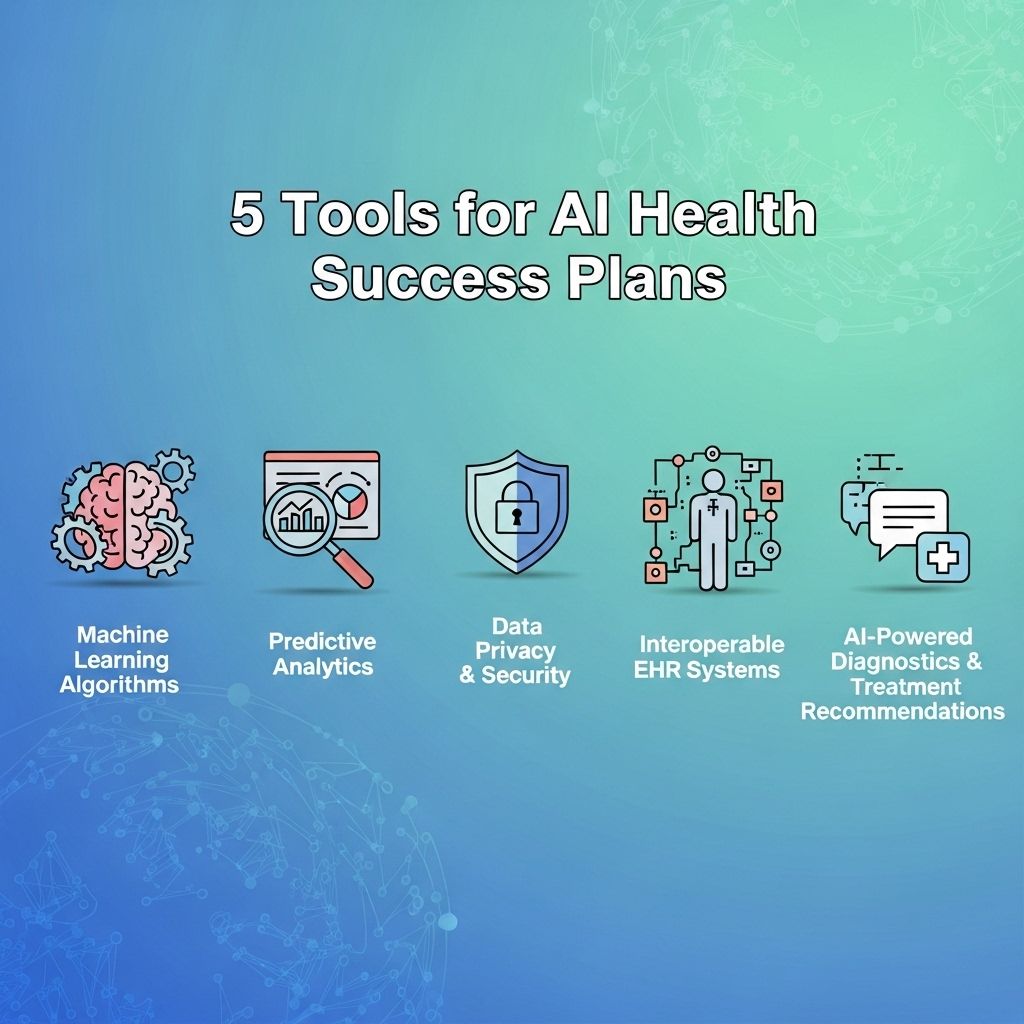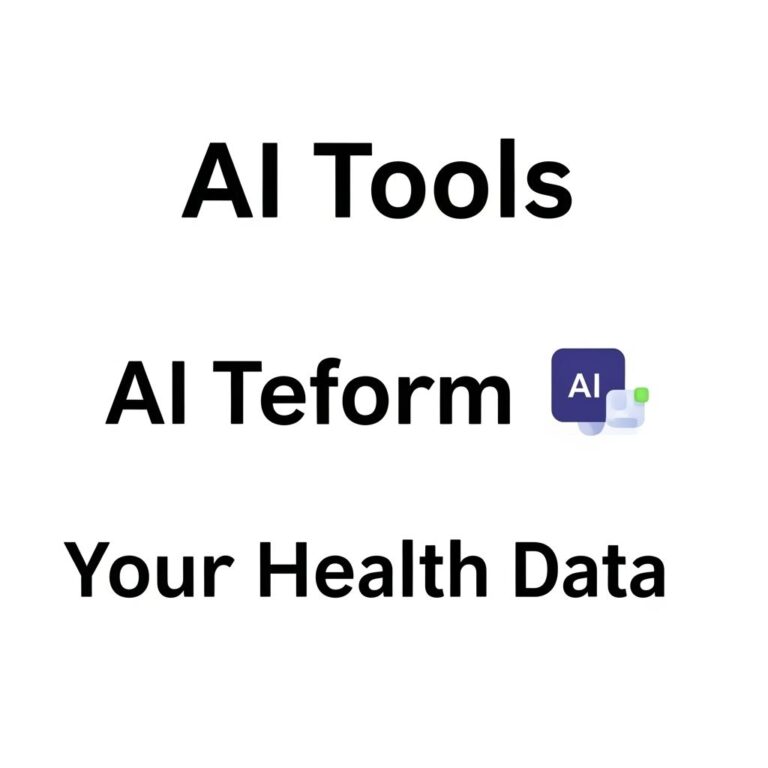In today’s rapidly evolving technological landscape, artificial intelligence (AI) is making significant strides in the healthcare sector. From predictive analytics to personalized treatments, AI is revolutionizing how healthcare professionals approach patient care. To effectively implement AI in health success plans, various tools can assist in streamlining processes, improving patient outcomes, and enhancing operational efficiency. This article explores five essential tools that can contribute to successful AI health initiatives.
Table of Contents
1. Data Analytics Platforms
Data analytics platforms serve as the backbone of AI applications in healthcare. These tools allow organizations to collect, analyze, and visualize large datasets, providing insights that can lead to more informed decision-making. Popular data analytics platforms include:
- Tableau: A robust data visualization tool that helps healthcare professionals interpret complex datasets.
- Microsoft Power BI: A cloud-based analytics service that provides interactive data visualization and business intelligence capabilities.
- IBM Watson Health: Utilizes AI for data analytics to provide actionable insights in patient care and operational efficiency.
Case Study: Improved Patient Outcomes
A healthcare organization implemented Tableau to track patient data and treatment efficacy. By visualizing trends and patterns, they identified areas needing improvement, leading to a 20% increase in recovery rates.
2. Machine Learning Frameworks
Machine learning frameworks are crucial for developing AI models that can predict outcomes and personalize treatments. Some of the leading frameworks include:
- TensorFlow: An open-source framework widely used for developing machine learning models, particularly in deep learning applications.
- PyTorch: A flexible framework that allows for rapid prototyping and is popular in academic research.
- Scikit-learn: A Python library that provides simple and efficient tools for data mining and data analysis.
Implementing Machine Learning Models
To implement machine learning models effectively, healthcare organizations should follow these steps:
- Identify the problem that needs solving.
- Gather and preprocess relevant data.
- Choose an appropriate machine learning model.
- Train the model with historical data.
- Evaluate the model and refine as necessary.
3. Natural Language Processing (NLP) Tools
Natural language processing is crucial for understanding and processing unstructured data in healthcare, such as clinical notes, patient feedback, and research articles. Various NLP tools can enhance AI health initiatives:
| Tool | Description | Use Case |
|---|---|---|
| NLTK | A suite of libraries and programs for symbolic and statistical natural language processing in Python. | Text analysis and classification in electronic health records. |
| spaCy | A fast library for advanced NLP tasks, designed specifically for production use. | Entity recognition in patient notes. |
| IBM Watson Natural Language Understanding | A cloud-based NLP service that uses machine learning to extract insights from text. | Sentiment analysis on patient feedback. |
Benefits of NLP in Healthcare
- Enhanced understanding of patient feedback.
- Improved accuracy in documenting patient histories.
- Efficient extraction of relevant information from large volumes of text.
4. Telehealth Platforms
Telehealth platforms have gained momentum, especially post-pandemic, and are essential for leveraging AI in remote patient monitoring and virtual consultations. Notable telehealth platforms include:
- Doxy.me: A simple, secure video conferencing tool for telemedicine.
- Teladoc: Offers a comprehensive telehealth solution with AI integration for symptom checking and triaging.
- Amwell: Provides on-demand access to medical professionals and integrates AI for decision support.
Enhancing Patient Engagement
To improve patient engagement in telehealth scenarios, consider the following strategies:
- Utilize reminders and notifications for appointments.
- Implement chatbot functionalities for immediate queries.
- Provide educational materials through the platform.
5. Electronic Health Record (EHR) Systems
Effective AI health success plans rely heavily on robust electronic health record systems. EHRs facilitate seamless data exchange and improve care coordination. Top EHR systems include:
- Epic Systems: A widely used EHR solution known for its comprehensive capabilities and interoperability.
- Cerner: Offers integrated health care solutions with AI features aimed at improving clinical outcomes.
- Allscripts: Focuses on providing open and connected EHR for enhanced health management.
Features of Modern EHR Systems
Modern EHR systems come with advanced features that support AI integration:
- Interoperability with other healthcare systems.
- Advanced analytics for patient population management.
- AI-driven clinical decision support tools.
Conclusion
Implementing AI health success plans requires a strategic approach, leveraging the right tools and technologies. Data analytics platforms, machine learning frameworks, NLP tools, telehealth platforms, and EHR systems all play vital roles in enhancing patient care and operational efficiency. By embracing these technologies, healthcare organizations can position themselves for long-term success in the AI-driven future.
FAQ
What are the top tools for creating AI health success plans?
Some of the top tools include IBM Watson Health, Google Health AI, Microsoft Azure Health, Amazon HealthLake, and Philips HealthSuite.
How can AI tools improve health success plans?
AI tools can analyze large data sets, predict patient outcomes, personalize treatment plans, and enhance decision-making for healthcare providers.
Are there specific AI tools for patient monitoring?
Yes, tools like Fitbit, Apple Health, and various telehealth platforms utilize AI to monitor patient health metrics in real-time.
What role does data analytics play in AI health success plans?
Data analytics helps identify trends, forecast health risks, and measure the effectiveness of care strategies, all essential for successful health plans.
Can AI tools be integrated with existing healthcare systems?
Most AI tools are designed to integrate seamlessly with existing healthcare systems, enhancing their capabilities without requiring a complete overhaul.


